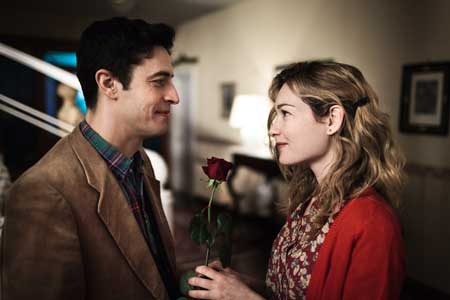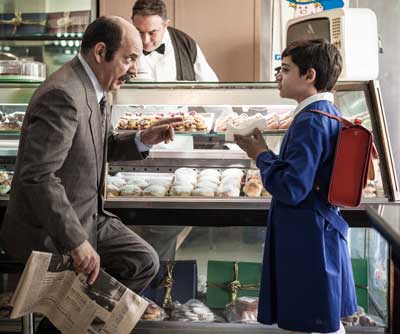Film (2013)
Directed by Pierfrancesco Diliberto “Pif”
Screenplay by Michele Astori, Pierfrancesco Diliberto, Marco Martani
In Italian, with English subtitles
Kendall Square Cinema, Cambridge, MA
With Cristiana Capotondi (Flora, adult), Pif (Arturo, adult), Alex Bisconti (Arturo, child), Ginevra Antona (Flora, child), Claudio Gioè (Francesco), Barbara Tabita (Arturo’s mother), Rosario Lisma (Arturo’s farther), Enzo Salomone (Rocco Chinnici), Maurizio Marchetti (Jean Pierre), Antonio Alveario (Totò Riina), Antonino Bruschetta (Fra Giacinto), Totò Borgese (Salvo Lima), Domenico Centamore (Leoluca)

Cristiana Capotondi as Flora
in “The Mafia Kills Only In Summer”
Photo: Courtesy of Distrib Films
Starting in the 1970s and ending in the 1990s, this sweet and humorous account told from the perspective of Arturo, who begins as a child and winds up as a young adult. Growing up in Palermo, Arturo gradually becomes aware of the violence imposed by the Mafia, though it is clear that almost everyone around him, including his parents, dodges the issue. As judges and ministers who have attempted to mete out justice fall to mob assassinations, Arturo’s world is shaken. Meanwhile, he develops a passionate crush on a new girl in school, Flora, for whom he pines endlessly. As well, he decides, for a variety of comical reasons, that the figure of the Prime Minister of the time, Giulio Andreotti, speaks to him in a particularly personal way. Torn between unrequited love and the omnipresent reminder of mob violence, Arturo finds in Francesco (Claudio Gioè), a young local journalist who befriends him, the seeds of a vocational direction.
Bearing some relation to the style of comedy employed in the 2001 hit written and directed by Jean-Pierre Jeunet, Amélie, this film plays the whimsically ironic card, here in a considerably more serioso context. The sweetness and elegance of the film derives from its commitment to the perspective of its protagonist, smitten with young love, whose awareness of the tragedies surrounding him gradually makes its indelible impression.

in “The Mafia Kills Only In Summer”
Photo: Courtesy of Distrib Films
At one point, the children Arturo (Alex Bisconti) and Flora (Ginevra Antona) emerge precipitously as the young adult Arturo (Pif) and Flora (Cristiana Capotondi). Writer and director Pierfrancesco Diliberto “Pif”, who was born in Palermo in 1972, plays the adult Arturo, giving a charmingly bemused performance as the well-meaning and long-suffering want-to-be lover. Intent, but not always lucky, Arturo, conveyed quaintly and sympathetically as child and adult, emerges, amusingly, with some degree of craft and self-possession.
The battle between the government and law enforcement officials and the Mafia provides the landscape within which Arturo’s and Flora’s story is told, its stages marked by assassinations that touch upon their lives in one way or another. The film does not force its point, but suggests it in the context of its charming romance, and thereby makes that point quite forcefully. Arturo and Flora eventually come face to face with the challenges of this battle, but, again, the film, to its credit, stresses the subtleties of its effects on their relationship.
Clearly, writers and director have, in the introductory and final segments of the film, stressed the heroism of governmental officials who, during this fraught period, stared down organized crime. In telling the story, however, they effectively convey it by approaching it from the angle of innocent autobiography. In so doing, they bring to the fore the delicacy of nurturing and inspiring a developing conscience.
The portrayals of local corrupt politician Salvatore Lima, and Prime Minister Andreotti, with whom he was associated and by which connection was brought to trial for connections with the Mafia, are, among other incidents, drawn from the historical record of the time.
The lively score adds to the whimsical and comedic effect, keeping up with the continuing run of small gags that season the narrative and take the edge off its tragic dimensions.
– BADMan
Leave a Reply